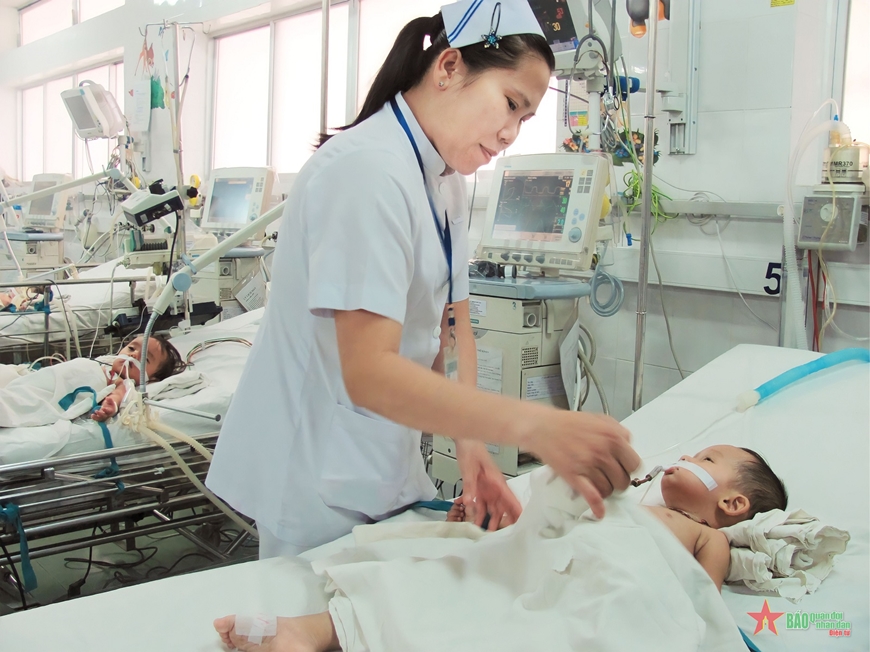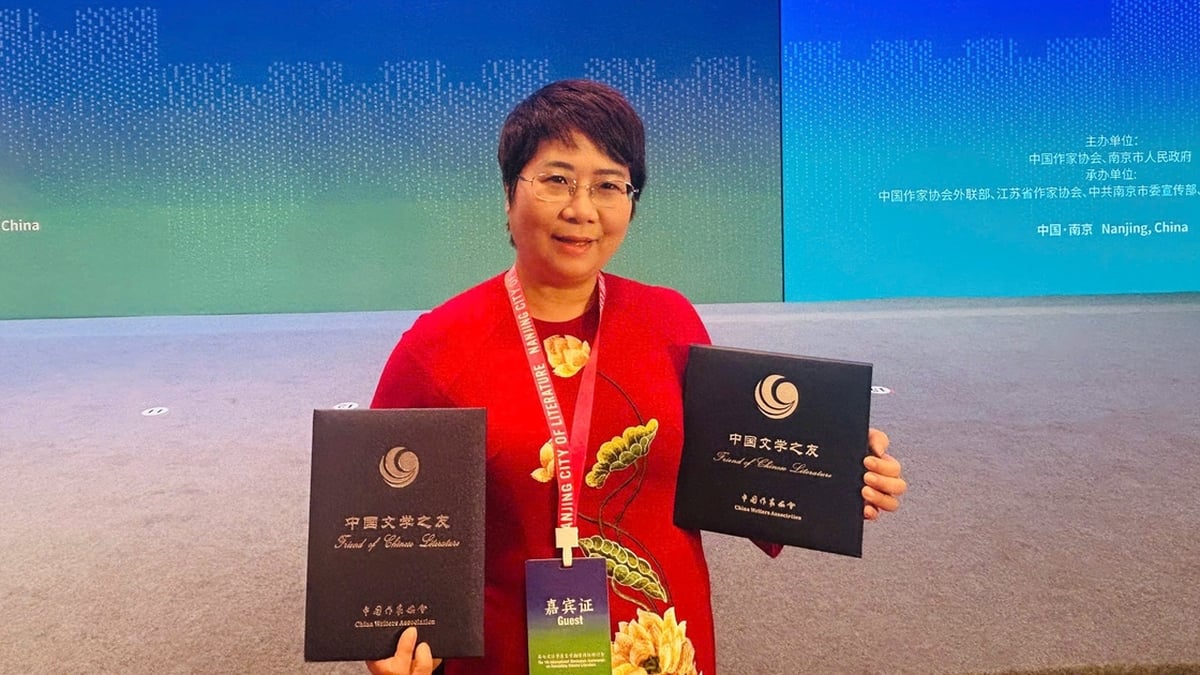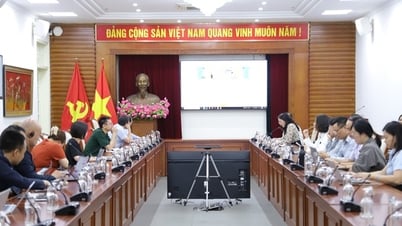Due to increasing density and rainfall, the situation of dengue fever (DF) and hand, foot and mouth disease (HFMD) in many southern localities, focusing on Ho Chi Minh City, is complicated. The number of cases is increasing sharply, many outbreaks appear, and there is a risk of "epidemic overlapping epidemic".
In recent days, the city's medical facilities have received a large number of seriously ill patients from many localities in the region for treatment. Ho Chi Minh City is stepping up many measures to prevent and control the epidemic, proactively responding, mobilizing resources to admit and treat severe dengue and hand and foot disease patients in the entire southern region.
The epidemic is complicated, there is a risk of "epidemic overlapping epidemic"
In late July, the examination and treatment area for dengue fever and hand-foot-mouth disease at Children's Hospital 1 and Children's Hospital 2 (Ho Chi Minh City) was always overloaded. The same situation occurred at the Hospital for Tropical Diseases in Ho Chi Minh City, when it received nearly 4,000 cases of dengue fever for examination and treatment, including many cases in severe respiratory failure. Doctor Du Tuan Quy, Head of the Department of Infectious Diseases and Neurology, Children's Hospital 1, said that the number of hand-foot-mouth disease cases admitted to the hospital in the past week has increased to 200 cases, 4 times higher than in previous weeks; many cases are in serious condition, requiring intubation and intensive care... Currently, the department has mobilized 100% of medical staff to participate in the on-duty work and is supported by medical staff from other departments to treat dengue fever and hand-foot-mouth disease patients. It is forecasted that hand-foot-mouth disease and dengue fever will continue to increase sharply in the coming months. Admission and treatment work is carried out by the Department of Infectious Diseases and Neurology in particular and Children's Hospital 1 according to the best plan and schedule.
 |
| Medical staff at Children's Hospital 2 (Ho Chi Minh City) take care of a child with dengue fever. Photo: Dong Kim |
The Ho Chi Minh City Department of Health has just released a report noting that the dengue and hand-foot-mouth disease situation is very complicated, with an unusual increase in cases and outbreaks earlier than every year. The peak of the dengue epidemic usually falls in the last months of the rainy season (October and November every year), but in May and June 2023, the number of dengue infections has continuously increased sharply, with more than 8,600 cases recorded by early July. In June 2023 alone, 758 cases were recorded, with 331 hospitalized and treated. There are currently 111 cases being treated as inpatients, including 10 severe cases with 4 on ventilators. The rate of severe patients transferred from the province accounts for about 70%, due to exceeding treatment capacity.
HFMD has had 125 outbreaks (including 70 outbreaks in schools and 55 outbreaks in the community), nearly double the number in the same period in 2022 (64 outbreaks). In June 2023, Ho Chi Minh City recorded 2,690 cases, including 569 inpatients. Of the 569 hospitalized cases, 118 were severe (the proportion of patients transferred from southern provinces accounted for nearly 76%).
According to the Ho Chi Minh City Center for Disease Control (HCDC), the Ho Chi Minh City health sector is activating the monitoring of outbreaks. On the "Online Health" application, the Ho Chi Minh City Department of Health has received more than 100 messages from people reporting addresses in the community with many mosquitoes and larvae (larvae) that are at risk of causing dengue fever. The results of inspection and monitoring of dengue fever outbreak risk points in July 2023 showed that the rate of larvae detected at monitored risk points was nearly 48% (49/103 points). This is an alarming figure, this rate will be higher in the last months of the rainy season. 12/22 districts and 23/312 wards and communes have an increase in the number of dengue fever cases compared to the average number of cases in the previous 4 weeks.
Active prevention, control, admission and treatment
The Ho Chi Minh City Department of Health predicts that from August to October 2023, the number of cases of hand, foot and mouth disease and dengue fever will increase rapidly if drastic preventive measures are not taken, the epidemic will last longer, causing "overlapping epidemics", making it difficult to respond and treat. Doctor Truong Huu Khanh, Vice President of the Ho Chi Minh City Infectious Diseases Association, shared that the harm caused by the two types of epidemics of dengue fever and hand, foot and mouth disease is very large, causing a burden on treatment and a high risk of death, so it is necessary to prevent and promptly handle cases of high fever lasting more than 48 hours. Disease prevention work must be thoroughly implemented to avoid the risk of "overlapping epidemics" in the coming months. Hand, mouth disease prevention must be carried out in both families and schools, while dengue prevention must be carried out together to kill mosquitoes and larvae; clean and sanitize areas where water stagnates to be effective.
Applying lessons learned from disease prevention and control, in 2023, the Ho Chi Minh City People's Committee and the health sector have proactively implemented plans and solutions to prevent, control and respond to various types of epidemics. Dr. Tang Chi Thuong, Director of the Ho Chi Minh City Department of Health, said that preventing and controlling epidemics during the rainy season or extreme heat has a very important preventive role from each family and individual. Personal hygiene habits; protecting the living environment; preventing and controlling mosquito larvae; detecting signs of disease for timely examination and treatment... need to always be promoted. Another important solution is that the grassroots health sector promotes correct classification and complete handling of epidemic risk points in the management area.
The new measures currently being implemented by the Ho Chi Minh City health sector are to strengthen the dissemination of measures to prevent and control dengue fever and hand-foot-mouth disease right from the beginning of the year through many channels: Direct dissemination, via social networks... combined with proactive response measures, classification, treatment stratification, and readiness for all epidemic situations to handle and suppress the epidemic. For dengue fever, focus on handling epidemic risk points, stratifying admission and treatment, and implementing internal or inter-hospital red alert procedures. In particular, the Ho Chi Minh City Center for Disease Control will strengthen monitoring of dengue fever risk points, and those who do not comply with the instructions will be severely punished. For hand-foot-mouth disease, the Ho Chi Minh City Department of Health has developed a response scenario including "3 levels", implementing treatment stratification with the last level being specialized pediatric hospitals and tropical disease hospitals.
Another new point is that the Ho Chi Minh City health sector has established a team of experts to treat infectious diseases such as dengue fever and hand-foot-mouth disease, consult and promptly treat severe cases in hospitals in the city and severe cases transferred from other localities, ensuring safe transfer to other hospitals. On the other hand, the Ho Chi Minh City health sector continues to apply the stratified model in the work of admitting and treating dengue fever, strengthening the operation of the Dengue fever treatment expert team; continuing to implement the red alert procedure for dengue fever patients. The Ho Chi Minh City health sector is stepping up support for the line, closely coordinating with the health sectors of localities to do a good job of screening, classifying, transferring to other hospitals, treating, ensuring safety and quality of treatment for patients, especially severe cases, affirming the role of supporting the treatment of specialized infectious diseases for the southern localities.
DANG TRUNG KIEN
* Please visit the Health section to see related news and articles.
Source






















![[Photo] National Assembly Chairman Tran Thanh Man visits Vietnamese Heroic Mother Ta Thi Tran](https://vphoto.vietnam.vn/thumb/1200x675/vietnam/resource/IMAGE/2025/7/20/765c0bd057dd44ad83ab89fe0255b783)













































































Comment (0)